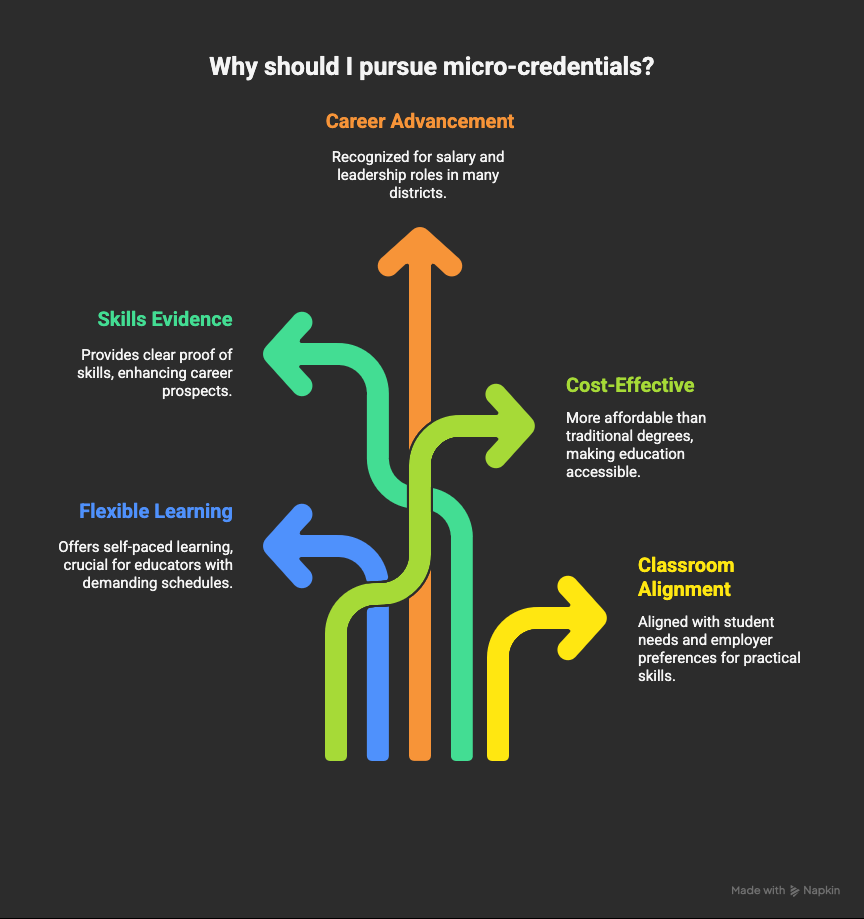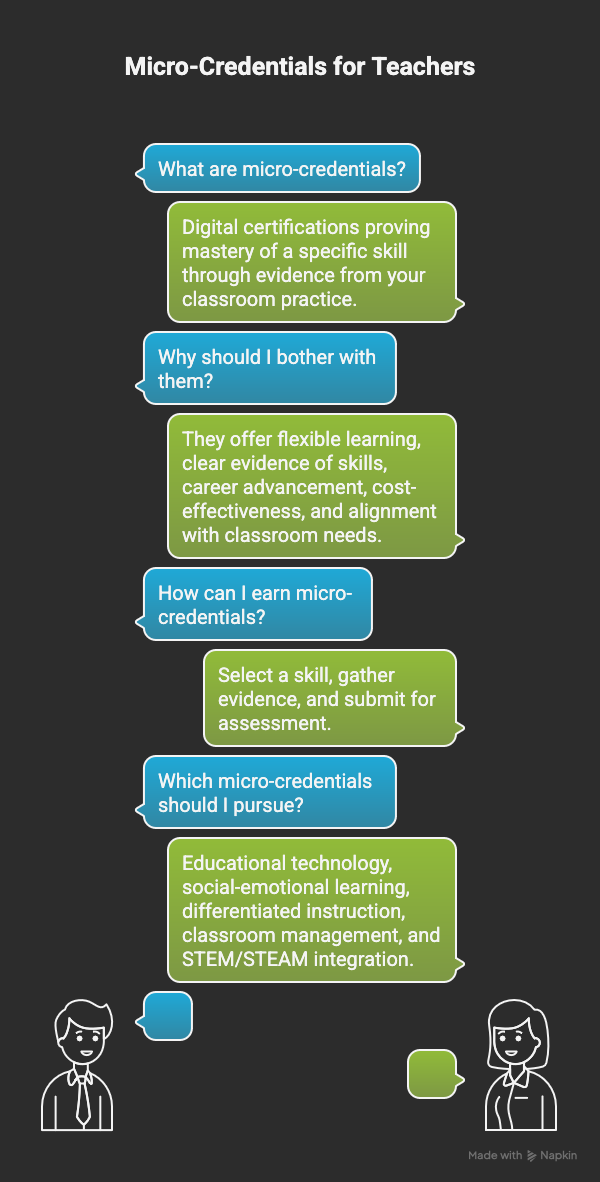Why are micro-credentials transforming professional development for teachers?
Micro-credentials offer teachers a practical, personalized, and evidence-based way to grow their skills. Unlike traditional PD sessions, these digital certifications validate real classroom competencies through submitted evidence like lesson plans and student work. Recognized across 31 U.S. states, micro-credentials support salary advancement, align directly with teaching needs, and cost a fraction of traditional degrees—empowering educators to learn, prove, and advance on their own terms.
If you’ve ever left a professional development session wondering how it actually applies to your classroom, you’re not alone.
A Education Week survey found that 48% of teachers feel the PD they receive isn’t aligned with their biggest needs - a telling sign that the traditional model is falling short.
That’s why many educators are turning toward a more personalized, evidence-based alternative: micro-credentials.
Instead of passive workshops, these digital certifications allow teachers to learn at their own pace, apply new skills in real classrooms, and demonstrate mastery through real-world evidence.
Let’s take a closer look at how this approach is changing the way teachers grow, learn, and lead.
What Are Micro-Credentials, Really?
Think of a micro-credential as a digital certification that proves you have mastered a specific skill.
To earn one, you don't just sit through a course; you have to actively demonstrate your competency by submitting evidence from your own classroom practice, such as lesson plans, student work samples, or video recordings.
Once your evidence is reviewed and approved by expert assessors, you are awarded a digital badge that you can share on your professional profiles and resume.
Why Should You Bother With Them?
This is where it gets exciting. Micro-credentials offer tangible benefits that go far beyond just logging professional development hours.
- They Offer Flexible, Self-Paced Learning. You can complete micro-credentials on your own schedule - evenings, weekends, or during school breaks. This flexibility is a huge advantage for educators with demanding schedules. According to a study on their impact, this accessibility is especially crucial in situations where face-to-face professional development is challenging.
- They Provide Clear Evidence of Your Skills. A traditional transcript lists courses, but a micro-credential details exactly what you can do. This is powerful for your career. In fact, individuals with digital credentials get viewed six times more often during job hunts, according to Modern Campus. When you're updating your teacher resume, having a section for these proven competencies can make you stand out.
- They Lead to Real Career Advancement. Many school districts are beginning to recognize micro-credentials for salary advancement and leadership roles. According to Modern Campus, 31 states currently allow teachers to count micro-credentials toward continuing education in some capacity, with more states exploring similar policies.
- They Are a Cost-Effective Alternative. While a master's degree can cost tens of thousands of dollars, micro-credentials are significantly more affordable, often costing just a few hundred dollars or less. This affordability makes high-quality professional development accessible to a wider range of educators.
- They Are Directly Aligned with Classroom Needs. You choose what to learn based on your students' needs and your own professional goals. Plus, recent surveys show that 85% of employers now prioritize practical, job-ready skills over traditional academic credentials. And micro-credentials deliver exactly that - targeted skills you can apply immediately.

How Can You Micro-Credentials?
Getting started is more straightforward than you might think. The process is designed to be job-embedded and focused on practical application.
- Select a Skill: Browse platforms like Digital Promise or offerings from the National Education Association (NEA). Choose a micro-credential that aligns with your professional goals, such as "Formative Assessment" or "Learner Engagement."
- Gather Your Evidence: The platform will provide resources and a clear rubric. You'll then collect evidence from your classroom - like videos of you teaching, student work, and written reflections that demonstrates your mastery of the skill.
- Submit for Assessment: Upload your evidence to the platform. It will be reviewed by trained assessors who provide feedback. If your submission meets the criteria, you earn the digital badge.
Which Micro-Credentials Should You Pursue?
While there are hundreds of options, some areas are particularly in high demand right now. Focusing on these can significantly boost your professional standing and your overall skills.
- Educational Technology: Credentials like "Google Certified Educator" or those focused on integrating specific ed-tech tools are highly valued.
- Social-Emotional Learning (SEL): As schools increase their focus on student well-being, skills in SEL are critical.
- Differentiated Instruction: Demonstrating your ability to meet the needs of diverse learners is always a powerful skill.
- Classroom Management: Effective classroom leadership is a foundational skill that districts are always looking for.
- STEM/STEAM Integration: If you teach in these areas, a micro-credential can showcase your expertise in project-based, hands-on learning.

Are Micro-Credentials the Future of Teacher PD?
All signs point to yes. They offer a personalized, competency-based model that respects teachers as professionals.
The traditional "one-size-fits-all" model of professional development has long been criticized for its lack of impact on classroom practice.
Micro-credentials directly address this gap by requiring teachers to apply what they've learned and show evidence of that application. This makes the learning immediate and relevant.
A recent report highlights that districts use them to verify educators' skills and offer skill-based rewards, which can improve teacher retention.
School districts are also seeing the value in this approach for retaining quality educators. By offering micro-credentials as a path for growth and recognition, they can promote educator agency and self-efficacy.
Furthermore, the National Education Association is actively developing AI-focused micro-credentials, showing that this model is being used to keep educators on the cutting edge of new technologies.
Also Read: What are some jobs that former teachers can land?
Wrapping Up
By breaking down complex teaching practices into manageable, verifiable skills, micro-credentials empower you to take control of your professional growth.
They provide a clear pathway to becoming a more effective educator while offering the recognition you deserve for your hard work and dedication.
And with Hiration, you can turn every credential into a story of proven skill through a polished resume, confident interview preparation, and a standout LinkedIn presence.
Our AI-powered platform helps you highlight your achievements in the most compelling way, so every skill you’ve earned gets the recognition it deserves.
Keep learning, keep growing - and let your skills speak for you.
Micro-Credentials for Teachers — FAQ
What are micro-credentials?
Micro-credentials are digital certifications that verify a teacher’s mastery of a specific skill. Unlike traditional PD, they require submitting real classroom evidence—like lesson plans or student work—for expert assessment before earning a badge.
Why are micro-credentials better than traditional PD?
They are self-paced, evidence-based, and directly tied to classroom practice. Studies show that educators who complete micro-credentials feel more confident and demonstrate greater skill retention compared to traditional PD attendees.
Can micro-credentials impact my career advancement?
Yes. Many school districts now recognize micro-credentials for salary advancement, promotions, and continuing education credits. As of now, 31 U.S. states include them in their educator development frameworks.
How do I earn a micro-credential?
Choose a topic aligned with your goals, gather classroom evidence that demonstrates mastery, and submit it to a platform like Digital Promise or NEA. Trained assessors evaluate your work and issue a verified digital badge if criteria are met.
Which micro-credentials are most valuable for teachers today?
In-demand areas include Educational Technology, Social-Emotional Learning, Differentiated Instruction, STEM/STEAM integration, and Classroom Management—skills that directly influence student outcomes.
Are micro-credentials recognized nationally?
Recognition varies by district and state, but their adoption is expanding rapidly. Many education agencies and organizations like the NEA and Digital Promise are leading nationwide implementation.
How much do micro-credentials cost?
Most range between $50 and $300, making them an affordable alternative to graduate credits or master’s programs that can cost thousands of dollars.
How can Hiration help educators highlight micro-credentials?
Hiration’s AI-powered platform helps teachers showcase micro-credentials effectively through resume optimization, interview prep, and LinkedIn updates—transforming verified skills into clear professional growth stories.



